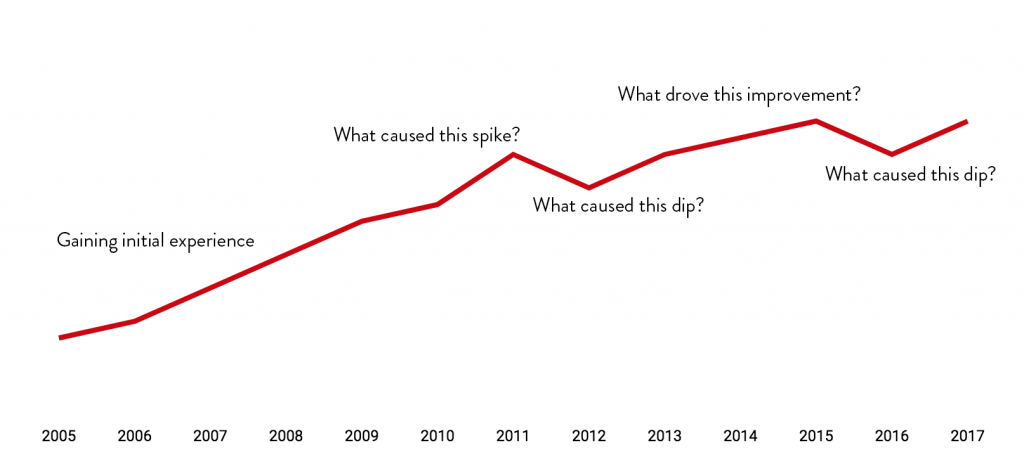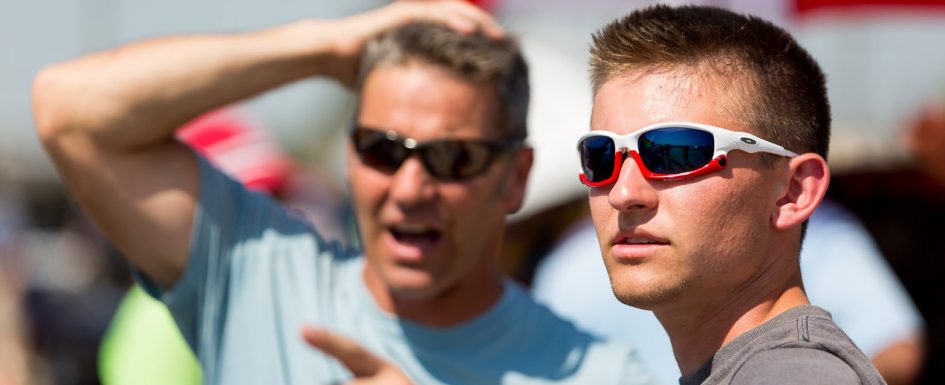We hear experts talk about this with F1, or hear our racing friends lament about it, or perhaps we have experienced it for ourselves over years of competition:
There comes a point in time when a driver no longer has the pace that he/she once did.
The most common explanation is that reaction time slows down with age, and on the surface that seems like a reasonable justification. But turns out that doesn’t hold up under scrutiny, and in order to really understand what’s going on, we need to think more deeply not just about our physical abilities, but our mental approach, as well as our motivations.
It is worth considering whether there is any actual evidence to support the claim that younger drivers have advantages when it comes to ultimate pace, or if the observation is just anecdotal. In order to get some real world insights, I leaned on the expertise of 3 people:
- One of the most prolific driving coaches of the last several decades
- A 13 time Autocross and Pro Solo national champion who has wins from 1990 through 2014
- A performance psychologist and author who has worked with amateur and professional athletes of all ages
They each shared insights from their own experiences as top performers, as well as things they have learned from coaching others.
Consider driver #1 who began racing at age 5 and is now 25, and driver #2 who started at 30 and is now 50. Each of them has 20 years of experience. Also consider driver #3 who started at age 10, enjoyed tremendous success for decades, but isn’t able to go as fast now at 60. I asked the 3 experts what differences they have seen in how these different drivers might think about racing/performance, what they tend to do well, what they tend to struggle with, and perhaps most importantly, the differences in how they learn?
Differences in how we learn
You may have heard that learning languages is easier when we are kids, but have you ever considered why that may be? The primary reason is that the younger brain is more malleable; it is better able to rewire itself and form new neurological connections. Studies show that kids and adults can both pick up new skills just as well as each other initially, but because of their greater ability to form new neurological connections, kids are better able to retain newly learned skills. This is an important distinction to take note of: Younger people are NOT better at picking up new skills, they are better suited to retaining (and thus building on) what they have learned.
Studies also show that kids learn more effectively because adults simply do not focus as much. Adults are more apt to being impatient, distracted, feeling like they have “already put in the time”, and expecting immediate results. Going one step deeper, this comes down to which part of our brains we rely on to learn. When learning feels like “playing” (as is often the case when we are younger), it is unencumbered by the weight of outcome, and our subconscious mind efficiently catalogs the experiences and lessons for a lifetime. As we age, we have more subconscious distractions, and we rely on sheer willpower to learn using primarily our conscious mind, which is less efficient. Of course we can still learn in this way; it just takes more effort, discipline, and time.
To summarize, we acknowledge that while learning becomes harder as we age, it is not an insurmountable obstacle as long as we are willing to put in the effort.
So, what are some of the driving related things that are harder to learn (or retain) as we age?
All 3 experts said that first and foremost are the visual techniques that supply situational awareness and the pattern forming of corners/maneuvers. Second is the feel of the vehicle as it builds g-forces in and out of maneuvers, how our inputs affect those forces, and how the vehicle operates at the limit. Drivers that start at a very early age build up second-nature instinctive behaviors that become part of their subconsciousness. People who encounter drivers who got an early start see it only as “innate talent”, but all too often it is the result of lots of training/playtime.
Interestingly, this isn’t just true for younger people who engage in “real” practice; it holds even for video gamers and sim racers! They may not feel any g-forces while gaming in their living room and the visuals may be limited by a single screen, but in the same way a three-legged dog learns to compensate, or a blind person builds up their hearing, people who grow up gaming build up other subtle cues to compensate.
The broader point is that younger drivers (or those that start out younger) tend to have a better grasp on processing the visuals, and have more finely calibrated g-force sensitivity. These are the things that are harder to learn (or retain) as we age. But as we have seen, just because it is harder does not mean it is impossible. A driver’s desire and work ethic remain the greatest factors. A 50-year-old who wants it more than a 25-year-old will likely do better.
Of course, that comes down to motivation, which we will get to in a moment.
Knowledge, experience, fear, and consequence
Habits (or mental programs) are simultaneously useful and limiting. Older drivers, having been alive longer, have more bad habits which need to be broken before new habits can be built. Younger drivers learn new habits a little quicker because they don’t have many/any old habits to break. They often don’t know what they shouldn’t do because they haven’t yet learned what they can’t do, which means they tend to experiment more with what is possible. As we get older, we inadvertently place limitations on ourselves without realizing. Take Max Verstappen’s drive in the rain in Brazil last year. He drove in places on the track that other drivers wouldn’t; even the best F1 drivers have some mental limitations that hold them back!
This willingness to experiment is absolutely critical. As we age, we tend to seek out simple answers to the complex sport of driving. “Use the entire width of the track”, “drive minimum distance in autocross”, “use a late apex”, etc. The list of self-limiting rules we place on ourselves over time is long, some of which are rooted in tribal wisdom from years ago that just isn’t valid anymore.
Related to this is the fact that as we get older, life teaches us fear and consequence. An older driver typically has more to live for! He/she has a family that relies on them for support, a home, and other things to lose if something goes wrong. The younger driver either doesn’t have much to lose, or doesn’t know to think about it, and therefore will usually (but not always) take more chances. We may not consciously ponder our well being or mortality every time we are in a car, especially in the confines of autocross, but this can certainly play a role on big high speed race tracks.
That said, none of this is an insurmountable challenge either. We can inspire ourselves to experiment, challenge our habits, and overcome our fears. But only if we actually want to. Only if we remain sufficiently motivated.
Motivation and desire
Many things happen as we age. For one, our ambitions change. We more readily accept “our place in life”. Non-motorsports career success may become the most important competitive metric. Building a family and focusing on the success of your offspring may replace personal ambition. The amount of time real life allows for hobby activities may go down. With less motivation and less time, our skills stagnate, and we become less inclined to invest in exploring the latest techniques and the newest tools for learning. How many people dismiss the idea of reading or taking an online course for racing, citing “I don’t learn that way” as the reason, without ever actually trying it? That’s a self limiting habit in action.
All 3 experts agree: The biggest difference in our performance as we age is because of change in motivation. As we age, we are not always willing to put in the work to improve. This might be because there is no need – the person is already “set” in life; it might be because the effort it takes is more than they are willing to put in. The fact is, if we are not willing to do what it takes to improve, we won’t. This holds true at all levels – whether we are trying to be the absolute best at our chosen motorsport, or just improve our skills from their current level.
As we grow older, we have a natural tendency to get stuck in our ways, to think we have learned all there is to know, and our attention to detail suffers. It isn’t aging bodies that cause us to slow down as much as us simply losing motivation.
Of course, none of this minimizes the fact that there are clear and known performance degradations of the human body and mind (though they differ for each of us). “Use it or lose it” is true for our physical and mental faculties, and performance driving employs both. Degradation on the physical side makes our car control suffer, whereas degradation on the mental side affects things like pre-race mental imaging, in-race focus, etc. Memory issues are a very real thing as well, not to mention the effect of diseases and such.
As for reaction times… you know why that doesn’t matter so much? Because reactions are by definition delayed; they occur after the stimulus. While reactions are vitally important for accident avoidance, when it comes to driving fast, what proves more important is our ability to anticipate.
Through all of this, the biggest takeaway for us is that if you really want to be faster, no matter how old you are, you can! Challenge yourself to learn in ways you haven’t done before. Be introspective enough to identify and break long held habits. Inspire yourself to try new things on and off the track. It isn’t difficult to do if you have the will. It goes beyond seat time.
Take that thought into the off season, and think about how you are going to push yourself to improve in 2018.
TAKE ACTION: The performance psychologist I mentioned above had me perform a very simple exercise that I found super helpful! He asked me to draw a graph of how I felt my driving abilities have changed over time. After plotting out my chart, I found it extremely illuminating as a tool through which to reflect on the factors that helped me improve vs. factors that caused me to slow down.

I highly recommend plotting out your own perceived performance. Don’t stress too much about the accuracy; going by feel is ok! Your graph may be pointing upwards, stay flat, or go downwards, but along the way there will surely be upswings and downswings. Be introspective about what caused those positive and negative movements. You may find patterns that give you new insights into what conditions and factors cause you to perform better or worse.


I find the graph of your perception of your driving abilities interesting and informative. What caused your perception of your abilities to change? Were there performance statistics that informed your perception (e.g., class standing, competition with others, etc.)? If the perception were data based, I would think that it could provide the basis for a plan to improve your performance. I know that I judge my performance against other autocrossers with whom I know to be good drivers and consistent in their performance. Thanks for your insight. I take issue with the contention that age causes one to seek simple answers to complex questions. I think that it’s the opposite.
Stefan, my self analysis was based on objective and subjective parameters. Objectively, I considered my average finishing position (and delta from winning) locally as well as nationally. Subjectively, I put that in context of other factors that may have influenced the results (weather, the car I happened to be driving, any other circumstantial things). And all of that is combined with a general feeling of how much I feel like I left on the table.
I find the graph of your perception of your driving abilities interesting and informative. What caused your perception of your abilities to change? Were there performance statistics that informed your perception (e.g., class standing, competition with others, etc.)? If the perception were data based, I would think that it could provide the basis for a plan to improve your performance. I know that I judge my performance against other autocrossers whom I know to be good drivers and consistent in their performance. Thanks for your insight. I take issue with the contention that age causes one to seek simple answers to complex questions. I think that it’s the opposite.
True in many ways, but also applicable to the level one is racing on. On a world championship level and a very competitive national level (Formula Ford / Formula Mazda) I would absolutely argue this is true.
On a club level this is inaccurate and is proven by several people who are still active in various series well into their 60s and 70s. A pro level Formula Atlantic driver from the 1980s Formula Atlantic series can handle people in their 20s in club level Formula Ford.
Conversely a club level autocrosser would not be competitive in club level Formula race cars with high downforce if matched against people who have been racing those cars since they were 20. It all depends on the car and the series in my experience.
Having started autocross at 54, I think about such things from time to time. What if I’d started at 40, or even 30? Then, I forget about it and just keep going. 62 now and still getting faster… maybe for another few years if I’m lucky (and do the right things.)
i am 65 and have raced off and on for many years and have not improved much in the last 2 years and have got it in my head that age is the main factor .thank you for your article now i must decide how much commitment i will give to getting better and not blame my stagnation on age but williness to work harder
Interesting reading….I am 74 and been soloing off and on since 1970. I found I get more competitive each season thru the end of the season after a lot of seat time….but then start out slow the next season with the winter layoff.
I can not find anywhere on this web page who is writing….I want to know the experience and credentials of who is writing?
Larry, email me at vivek@beyondseattime.com. I’m happy to discuss my experience with you 🙂